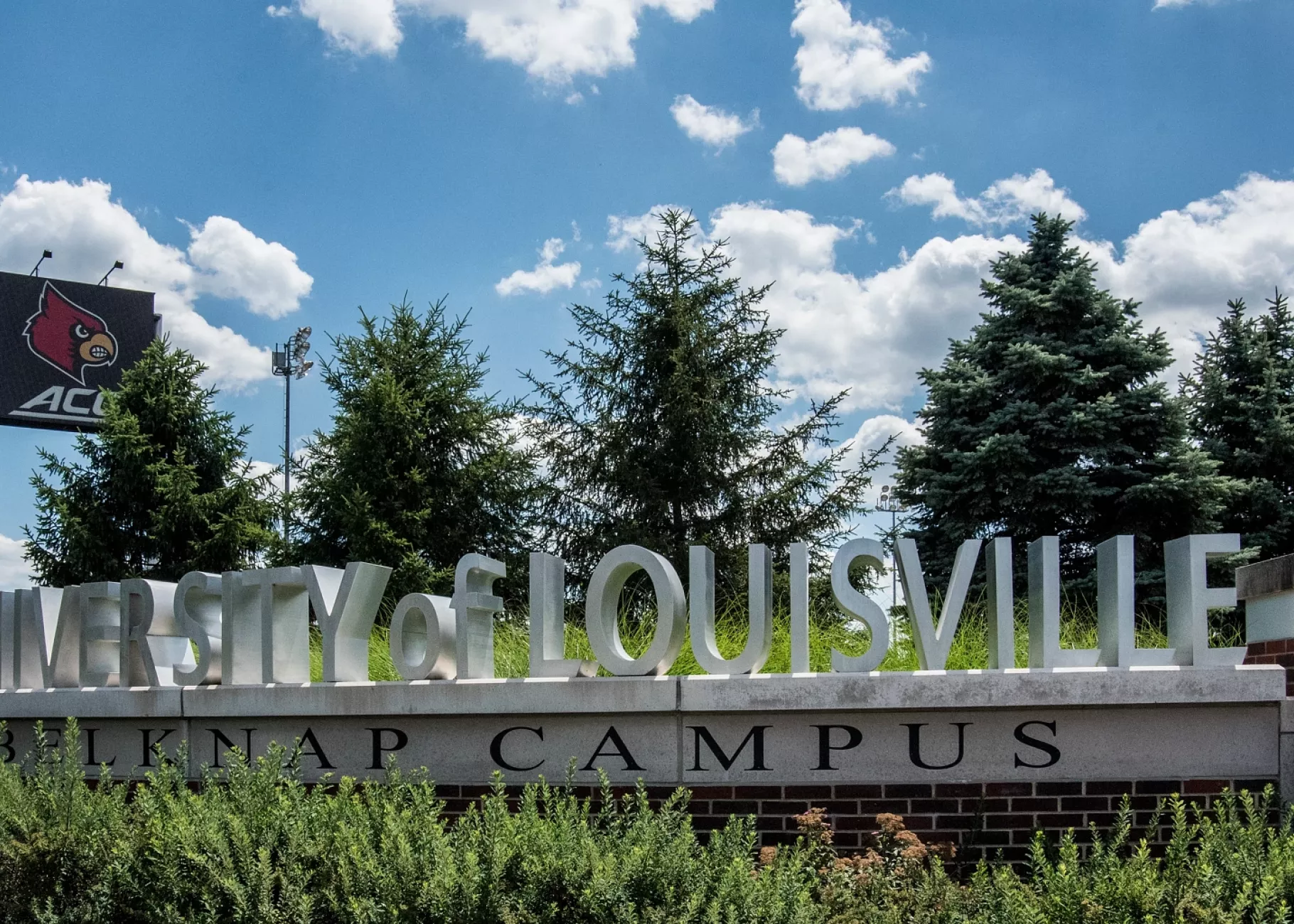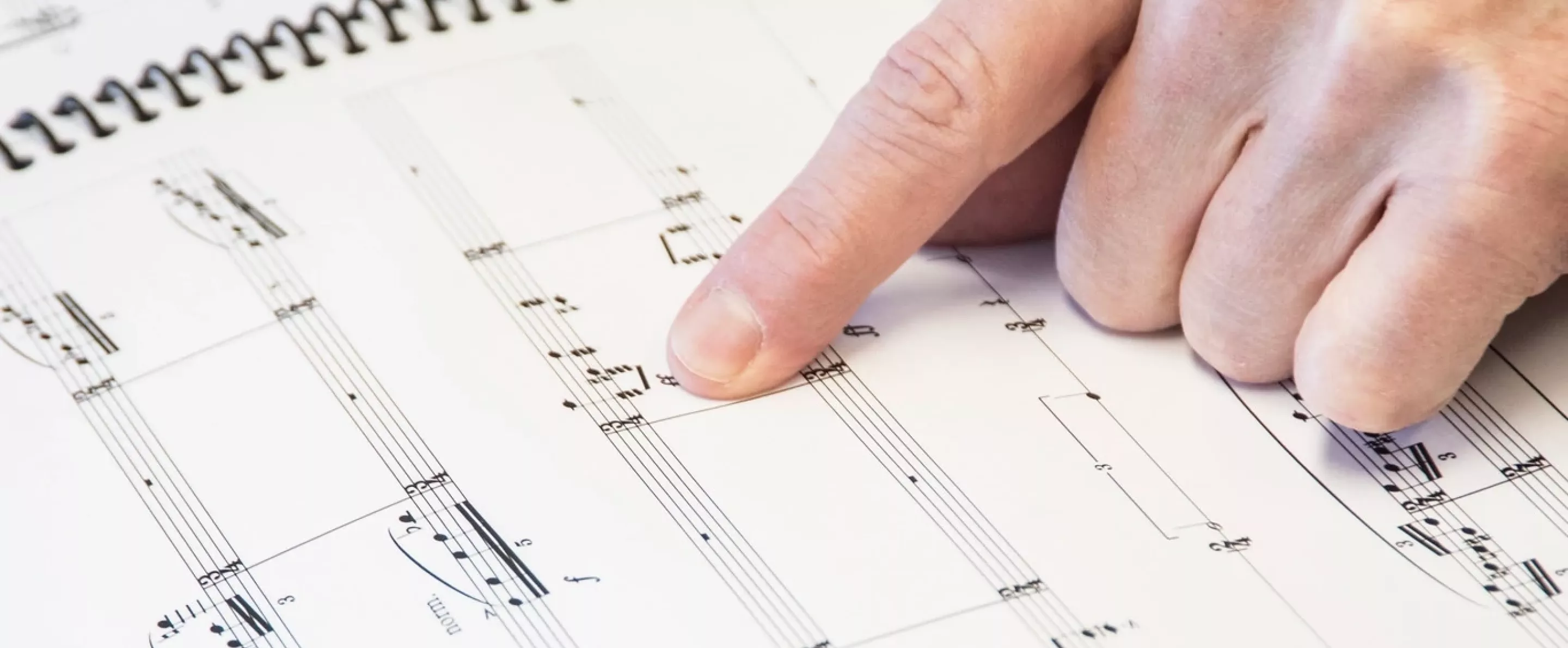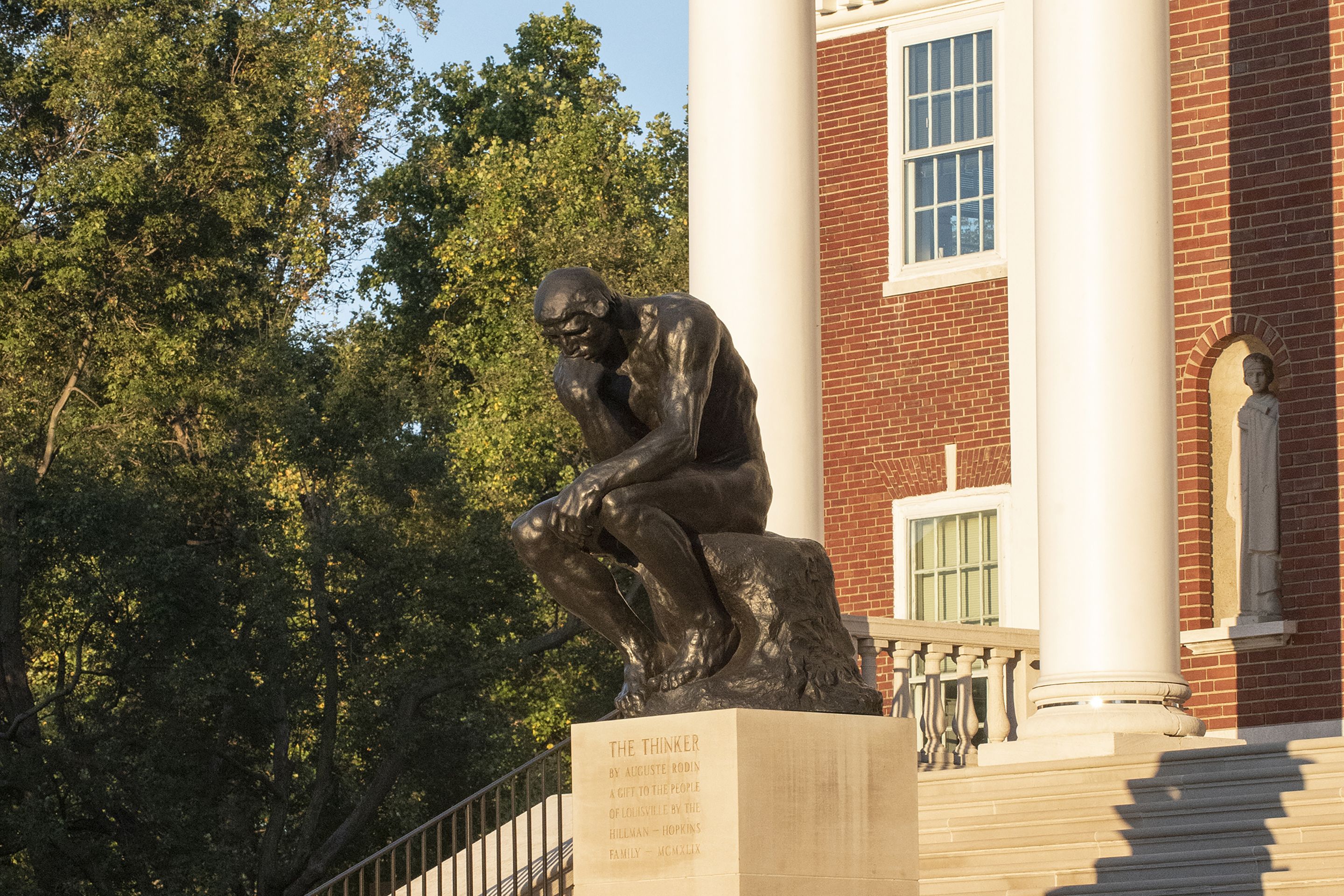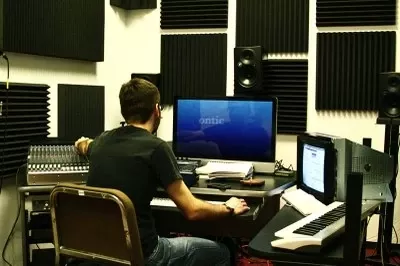Sidebar
Composition students at the University of Louisville School of Music present several concerts of their own new works each year, performed by peers, guest artists and faculty. These concerts are recorded, and every student composer will receive high-quality recordings of their compositions.
The faculty, facilities, resources, and events at the UofL School of Music offer exceptional opportunities for a thorough education in the fields of music composition and theory, as well as unique opportunities to hear and study a broad range of musical styles. Degrees in both theory and composition are available at the graduate and undergraduate levels. A core curriculum emphasizes recent compositional techniques as well as traditional tonal materials, with numerous classes in analysis, counterpoint, orchestration, and special seminar topics. Degree students have access to a state-of-the-art computer music studio, as well as a similar, but smaller computer music studio.
The School of Music is home to the Grawemeyer Award for Music Composition, one of the largest monetary prizes for music composition in the world. The Grawemeyer Collection, which is available for students' use, contains nearly five thousand entries from composers around the world. This is one of the best collections of new music in the world today. Each winner of the Grawemeyer Award for Music Composition visits campus for lessons, lectures and master classes, and in many cases establishes an ongoing relationship with the School of Music. The annual New Music Festival, the Grawemeyer Award, and the New Music Concert Series are among the many events that bring distinguished guest composers to campus. Student composers have regular and frequent opportunities to work with these composers in master classes and individual lessons and in some cases have established continuing relationships. Grawemeyer Award winners, New Music Festival guest composers, and other visiting composers have included John Adams, Thomas Adès, Louis Andriessen, Daniel Asia, Simon Bainbridge, Leslie Bassett, Pierre Boulez, Chen Yi, Unsuk Chin, John Corigliano, Sebastian Currier, Brett Dean, Tan Dun, Donald Erb, Arthur Gottschalk, John Harbison, Sidney Hodkinson, York Höller, Karel Husa, Aaron Jay Kernis, György Kurtág, Libby Larsen, Peter Lieberson, David Maslanka, Per Nørgård, Shulamit Ran, Kaija Saariaho, Esa-Pekka Salonen, Bent Sørenson, Steven Stucky, Toru Takemitsu, Augusta Read Thomas, Joan Tower, Chinary Ung, Michel van der Aa, and Ellen Taaffe Zwilich.
UofL composition graduates have gone on to graduate work at the Eastman School of Music, Indiana University, the University of Michigan, the Royal Academy of Music in London, Cornell University, The Curtis Institute, the Peabody Institute, the University of Illinois, the University of Texas, The University of North Texas, the University of California—San Diego, Brandeis University, Arizona State University, the University of Missouri-Kansas City, and others, usually with significant fellowships, assistantships or other financial awards. They are active in the field as composers, teachers, and performing musicians all over the US and abroad.
Learn about Composition & Creative Studies scholarship opportunities.
Academics
Bachelor of Music Composition (B.M.)
The Bachelor of Music Composition (B.M.) degree at UofL is a four--year program of study designed to develop a high level of expertise in music composition and related skills. In addition, the program encourages and promotes the development of each student's individual compositional "voice" or personality.
Composition Application Portfolio
In addition to the general School of Music admission process (which includes a performance audition), COMPOSITION MAJORS ALSO AUDITION BY SUBMITTING A PORTFOLIO OF ORIGINAL COMPOSITIONS: Your portfolio should contain three or four samples of original compositions, along with recordings for the same works, if possible. Evidence of experience using various instrumental and/or vocal combinations is helpful. Submit your most advanced and sophisticated work. If you have any questions about what to submit in the portfolio, feel free to ask questions before submitting.
Prepare a digital cloud-box, such as DropBox, OneDrive, or Google Drive and upload pdf scores and audio files to that. When you have finished all uploads, send the link to School of Music admissions advisor Laura Angermeier. Don’t send the link until you are sure that your portfolio is complete.
Composition Study
Six semesters of private composition study are required. Students will compose for a variety of different instrumental and vocal genres, as well as taking courses in electronic and computer music. They will be encouraged to expand their musical language through study of 20th- and 21st-Century styles and techniques of composition, as well as study of contemporary repertory. A number of music theory courses, including analysis and counterpoint, will support this work in composition.
Performance Opportunities for Compositions
There are many opportunities for performances of new compositions, and students will be encouraged to present their work regularly. There is at least one, and often two or more, student composer recitals each semester. There are also other UofL sponsored opportunities for performances. Frequently, students will have works performed on recitals of performance majors, at school-wide assemblies (called Convocations), or on concerts of student or faculty ensembles. Student pieces are selected by competitive submission for inclusion on the annual New Music Festival. There are often other opportunities for performances in the broader Louisville community. (See Senior Recital below.)
Senior Recital
During the last semester of study each student presents a Senior Recital of 45-60 minutes of music written while studying at UofL. Since most students usually have written more music than this by then, and since they have been presenting it regularly during their four years of study, the Senior Recital is typically a high point of great satisfaction and personal accomplishment. It's a big undertaking, and there's a lot to organize, but the composition teachers guide the process, and it's always an enjoyable, exciting event.
Learn more about program details and class information.
Bachelor of Arts in Music (New Media)
The Bachelor of Arts in Music with an emphasis in New Media is a four-year undergraduate degree designed to prepare you for a career creating music and sound for contemporary recording artists, film, television, and video games. Focusing on creativity and artistry through the use of music technology, the program provides training in digital media concepts and skills that are necessary for the creation and production of music and sound for a variety of cultural projects and products, from live performance and music albums to film and video games. If you are a musician with interests in composition, electronic music, music production, and recording, then this program can prepare you for a career in the music-making industry.
You will learn to creatively expand your approach to composition and song writing while simultaneously learning music production and mixing techniques. You will learn about using a Digital Audio Workstation (DAW) as a tool for music creation, audio recording, MIDI sequencing, effects processing, synthesis, sample libraries, sound design, and immersive audio mixing. You will learn how to use music to create mood and elicit emotions, how to match music and sound to film and video games, and how to produce music in a variety of styles and genres.
You will complete an internship in the industry during your junior year, and you will design and realize a capstone project during your senior year, with direct faculty mentorship and oversight. You will also complete a portfolio of creative work to share with potential employers and collaborators by the end of your senior year.
Because the Bachelor of Arts in Music with an emphasis in New Media degree program is housed within the School of Music, you will take classes in Music Theory and Music History alongside courses in Audio Engineering and Sound Design. You will have opportunities to collaborate with music students in other areas of the School on your creative music production projects, take instrument or voice lessons to hone your performance skills, and participate in performing ensembles.
Learn more about program details and class information.
Minor in New Media
The Minor in Music & New Media is designed to give students majoring in fields outside of music the opportunity to explore intersections between their major field of study and music production for contemporary recording artists, film, television, and video games. Work in the field of new media often necessitates interdisciplinary collaboration, and the Minor in Music & New Media creates opportunities for students from a variety of disciplines to learn music production and mixing techniques.
Learn more about program details and class information.
Master of Music Composition (M.M.)
The Master of Music Composition (M.M.) degree at UofL is a two-year program of study designed to further the expertise and experience of students who have already completed an undergraduate degree in music composition (or its equivalent). While most students who are admitted into the M.M. Composition program have received undergraduate degrees in music composition, students without an undergraduate degree in music composition may be accepted in the M.M. composition program if they (1) demonstrate compositional skills and experience approximately equivalent to an undergraduate degree in composition, and (2) hold an undergraduate degree or its equivalent, preferably (but not necessarily) in some area of music.
Submit the following documentation to the School of Music Admissions Office:
- Composition Portfolio (See below for more information. Deadline: January 15)
- A Letter of Interest for Graduate Teaching Assistantships or Departmental Service Awards. The School of Music bases awards on several factors including musical talent, academic achievement, priorities in instrumentation, and financial need. Awards are highly competitive. The letter can be emailed directly to the contact information listed below.
Submit the following documentation to Graduate Admissions:
- Completed application for admission, including the $60 application fee (Note: There is a $30 application for additional applications and applicants applying for re-admission to UofL). There is no additional application or fee for the School of Music. The application can be found online. Be sure to select your specific music major. Once you have applied, the School of Music will be notified of your application.
- Official transcripts from ALL colleges/universities attended
- Two (2) Letters of Recommendation (Note: The online letter evaluation provided through the online graduate application will suffice.)
Submit all materials by January 15. ALL of the above MUST be submitted before the School of Music can admit a student or make a scholarship offer.
Composition Application Portfolio
Graduate composition majors audition by submitting a portfolio. The composition portfolio is one of the primary tools for evaluating financial support. Your portfolio should contain three or four samples of original compositions, along with recordings for the same works, if possible. Evidence of experience using various instrumental and/or vocal combinations is helpful. Submit your most advanced and sophisticated work. If you have any questions about what to submit in the portfolio, feel free to ask questions before submitting.
Prepare a digital cloud-box, such as DropBox, OneDrive, or Google Drive and upload pdf scores and audio files to that. When you have finished all uploads, send the link to School of Music admissions advisor Laura Angermeier. Don’t send the link until you are sure that your portfolio is complete.
Curriculum Vitae
Students should also submit a curriculum vitae detailing education, any relevant work or teaching experience, and achievements, especially with regard to their compositional work. Excellent performance skills may also be valuable in obtaining financial support, through scholarships for performance in School of Music ensembles. For more information, please visit the School of Music financial aid information page.
Performance Opportunities for Compositions
There are many opportunities for performances of new compositions, and students will be encouraged to present their work regularly. There is at least one, and often two or more, student composer recitals each semester. There are also other UofL sponsored opportunities for performances. Frequently, students will have works performed on recitals of performance majors, at school-wide assemblies (called Convocations), or on concerts of student or faculty ensembles. Student pieces are selected by competitive submission for inclusion on the annual New Music Festival. There are often other opportunities for performances in the broader Louisville community.
Thesis Review
The program requires a thesis composition, which is typically a work for large ensemble (usually orchestra, but other ensembles will be considered). Bomhard Fellows are required to produce a thesis composition that features solo voice(s) with large ensemble or a dramatic work such as a one-act opera or its equivalent. The finished thesis composition is submitted near the end of the final semester of study (usually near the end of the second year of study).
The thesis composition is reviewed and must be approved by the student's three-person thesis committee of two composition faculty (one of whom is the student's composition teacher) and one other School of Music faculty member from outside the Theory/Composition Department. Members of the student's thesis committee must also be members of the UofL Graduate Faculty.
Graduate Oral Exam
After approval by the thesis committee of the thesis composition, each student meets for about 30 minutes with the Graduate Committee of the School of Music, a six person committee that includes a representative of each School of Music department. This meeting, called the Graduate Oral Exam, is a free-ranging question and answer session in which the student is given the opportunity to demonstrate a broad base of knowledge about music. There may be some degree of focus on the following: orchestration, music history and literature, and the subject matter of any music course taken while a M.M. student at UofL.
Learn more about program details and class information.
Faculty Information
Composition opportunites
The University of Louisville Computer Music Studios support research, production and creative work in the fields of electro-acoustic music, multimedia and sound art. Maintained by the School of Music, state-of-the-art computer music facilities accommodate introductory and advanced computer music classes that attract a broad spectrum of undergraduate and graduate students from various university departments and disciplines. Creative research conducted in the studios may involve audio synthesis, sound analysis, digital signal processing, algorithmic and fixed media multichannel composition, computer generated/assisted music, computer music improvisation, sound and multimedia art, installations, robotics, visual art, artificial intelligence, audio recording and post-production, among others. Two multichannel studios are equipped with powerful Macintosh computers, various digital audio interfaces, auxiliary digital and analog hardware and specialized software. The additional multi-user lab is equipped with computers supporting audio and digital production.
The Computer Music Studios strongly support and facilitate interdisciplinary collaborations as well as sponsor multiple events throughout the year, including guest lectures and presentations, master classes, concerts and events featuring guest performers and sound artists and student computer music concerts. In the Computer Music Studios we create an open-minded teaching, learning and research environment. We seek to discover knowledge and to expand our creative potential through innovation, imagination and expression in order to better understand ourselves in the universe.
Facilities
Computer Music Studio A (LL26) is equipped with state of the art recording, editing and mixing equipment. Its multichannel setup supports a Digidesign ProTools HD system as well as other audio interfaces. The lab is equipped with GENELEC speakers. This studio is used for both individual work and for classes. It seats up to 15 students.
The smaller Computer Music Studio B, the School of Music's recently created secondary studio, also supports a multichannel 5.1 surround system. This studio is primarily used by students to do their individual work.
Computer Music Concerts take place in Malcolm Bird Recital Hall, a 140-seat theater located on the south side of the building. The hall is equipped with HD video projection and a 5.1 surround sound setup.
What is the New Media program?
The Bachelor of Arts in Music with an emphasis in New Media is a four-year undergraduate degree designed to prepare you for a career creating music and sound for contemporary recording artists, film, television, and video games. Focusing on creativity and artistry through the use of music technology, the program provides training in digital media concepts and skills that are necessary for the creation and production of music and sound for a variety of cultural projects and products, from live performance and music albums to film and video games. If you are a musician with interests in composition, electronic music, music production, and recording, then this program can prepare you for a career in the music-making industry.
What will I learn in the New Media program?
You will learn to creatively expand your approach to composition and song writing while simultaneously learning music production and mixing techniques. You will learn about using a Digital Audio Workstation (DAW) as a tool for music creation, audio recording, MIDI sequencing, effects processing, synthesis, sample libraries, sound design, and immersive audio mixing. You will learn how to use music to create mood and elicit emotions, how to match music and sound to film and video games, and how to produce music in a variety of styles and genres.
You will complete an internship in the industry during your junior year, and you will design and realize a capstone project during your senior year, with direct faculty mentorship and oversight. You will also complete a portfolio of creative work to share with potential employers and collaborators by the end of your senior year.
Because the Bachelor of Arts in Music with an emphasis in New Media degree program is housed within the School of Music, you will take classes in Music Theory and Music History alongside courses in Audio Engineering and Sound Design. You will have opportunities to collaborate with music students in other areas of the School on your creative music production projects, take instrument or voice lessons to hone your performance skills, and participate in performing ensembles.
Learn about the annual New Music Festival.





